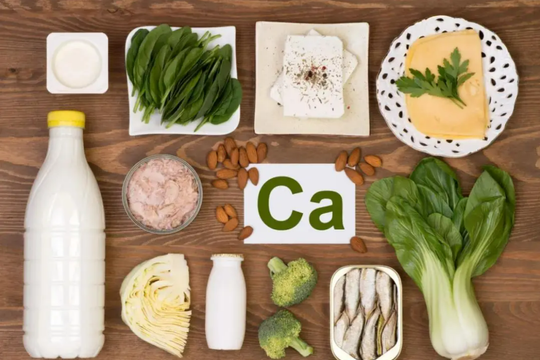Nutrients that the elderly need to supplement more
The body of an older person will undergo many changes - from hormonal changes, reduced ability to absorb nutrients to changes in metabolism.
According to Lauren Manaker, a nutritionist in the US, "Age can cause changes in metabolism and appetite, making it more difficult to get adequate nutrients." Below are nutrients that older adults need to supplement more to support a healthy body, according to the health page.Health.

Protein
As we age, our bodies lose muscle mass and our ability to build new muscle decreases. Muscle strength helps maintain mobility, maintain balance, and prevent falls.
According to studies, older adults should consume 1.2 to 1.6 grams of protein per kilogram of body weight per day.
Vitamin B12
Vitamin B12 plays an important role in red blood cell production and maintaining brain function. B12 deficiency can cause memory loss and increase the risk of dementia and Alzheimer's disease.
It is recommended that older adults supplement 6 to 10 micrograms of vitamin B12 per day for optimal levels. Vitamin B12 is found in seafood, eggs, milk, lean meat, and nutritional yeast.
Fiber is essential for the elderly.
Fiber is an essential nutrient at any age. However, as we age, our digestive system becomes more sensitive, making us more susceptible to problems like constipation, bloating, and diarrhea.
It is recommended that adults consume 14 grams of fiber per 1,000 calories, but it is best to consume more than 25 grams of fiber per day for better results.
Calcium
As people age, the risk of osteoporosis increases, especially in postmenopausal women.
According to the US National Institutes of Health, men under 70 need to consume at least 1,000 mg of calcium per day. After age 70, the need increases to 1,200 mg. For women, the recommended level is 1,200 mg/day after age 50.
Food sources rich in calcium include milk and dairy products (choose low-fat varieties), anchovies, sardines, green vegetables, soybeans, chia seeds, and beans.

Vitamin D
Vitamin D not only helps effectively absorb calcium but also helps reduce inflammation and reduce the risk of cancer. However, the ability to synthesize vitamin D from sunlight decreases with age.
Adults under 70 should consume 15 micrograms of vitamin D per day. Meanwhile, people 70 and older should consume 20 micrograms of vitamin D per day.
Besides sunlight, vitamin D is also found in salmon, eggs, and milk.
Magnesium
Magnesium plays an important role in muscle and nerve function and helps maintain strong bones. It also helps regulate blood sugar and reduce the risk of heart disease.
For adults over 30 years of age, the recommended intake of magnesium is 420 mg per day for men and 320 mg per day for women.
You can supplement magnesium through foods such as green vegetables, bananas, avocados, tofu, nuts and whole grains.
Omega-3
Omega-3 fatty acids have a role in protecting the heart, fighting inflammation, supporting brain function and slowing cognitive decline.
It is recommended that men aged 14 and over should supplement about 1.6 grams of omega-3 per day, while women need about 1.1 grams.
Foods rich in omega-3s include salmon, tuna, anchovies, flaxseeds, walnuts, oysters, and seaweed.





